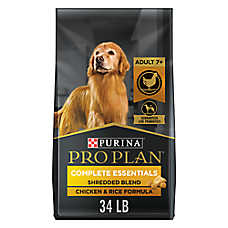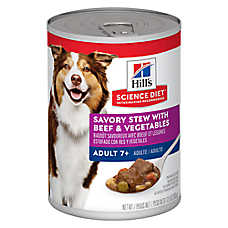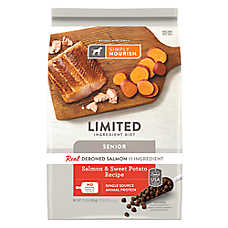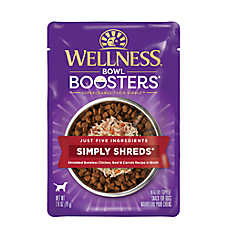Senior Dog Food: Nourishing Your Aging Companion

In this Article
As dogs enter their senior years, typically around the age of eight, their dietary requirements undergo significant changes. This shift is due to a natural decrease in metabolic rate and physical activity, often leading to weight gain and muscle loss. Senior dog foods are specifically formulated to address these changes. They typically contain fewer calories to prevent obesity, a common issue in less active senior dogs. However, they should include high-quality proteins to maintain muscle mass and support overall health.
What’s special about senior dog food?
Senior dog diets often incorporate increased fiber levels, aiding in digestion and preventing constipation, a common issue in older dogs. Additionally, these foods may include supplements like omega-3 fatty acids to support joint health and cognitive function, antioxidants to combat age-related cellular damage and probiotics to enhance gut health. Choosing a senior dog food that aligns with your pet's specific health needs is crucial, considering any age-related conditions like kidney disease, arthritis or diabetes.
Should I change my older dog’s diet?
Deciding when to switch to senior dog food depends on individual factors like breed, size and health status. Larger breeds may require a transition to senior-specific diets earlier than smaller breeds. Signs that it's time to switch include noticeable weight gain due to reduced activity, changes in coat condition or digestive issues. Especially as your dog ages, health factors like dog weight management become more important than ever.
For dogs with allergies, reluctance to change diets is a common concern. It's essential to be aware that hypoallergenic dog food options are available to cater to our geriatric pets with specific dietary sensitivities. These options can alleviate symptoms and improve quality of life without compromising on nutritional value.
When transitioning to a senior diet, look for foods with balanced nutrition, lower fat content and sufficient protein to maintain muscle health. Specialized diets can also address specific health concerns. Additionally, prescription diets are available to address common health issues in geriatric pets. Consulting with your veterinarian is crucial—they can recommend a specialized prescription diet or treat tailored to your dog's health needs. We carry a variety of these prescription diets in our store. Learn more about dog vet diet food and how get a prescription for your senior dog. Always ensure your senior dog has constant access to fresh water, as hydration is key to their overall health and well-being.
Transitioning your dog to senior dog food
Switching to senior dog food should be done gradually over a period of 7-10 days. Start by mixing a small amount of senior food with their current food, gradually increasing the proportion of the new food while decreasing the old food. Monitor your dog's digestive response and adjust the transition pace accordingly. Consider your dog's age, breed and health indicators when deciding when to start this transition.
More questions? Read our guide on safely changing your dog’s diet.
Addressing weight management in senior dogs
As dogs age, their nutritional needs and appetite can change, leading to challenges in weight management. Some senior dogs may become overweight due to decreased activity levels and a slower metabolism. In contrast, others may struggle to maintain a healthy weight due to a decrease in appetite or underlying health issues.
For overweight senior dogs:
For those carrying extra pounds, a diet formulated for weight management can be beneficial. These diets are designed to provide all the necessary nutrients while having a lower calorie content to help shed the unwanted weight safely. Incorporating gentle, regular exercise into their routine can also support weight loss and maintain muscle tone.
For senior dogs struggling to maintain weight:
Senior dogs with a reduced appetite or those struggling to keep on weight may benefit from diets with higher calorie content and enhanced palatability. Foods that are easy to digest and have increased levels of high-quality protein can help maintain muscle mass and overall health.
In both cases, it's essential to work closely with your veterinarian to tailor the diet to your senior dog's specific needs, ensuring they receive the right balance of nutrients to support their health and well-being at this stage of their life.
What if my senior dog is eating less?
If you notice a change in your furry friend’s appetite, your first step is to visit the veterinarian to rule out any medical problems. If the vet determines that your senior dog is healthy, there may be simpler reasons for the decreased appetite:
Appetite changes in senior dogs
A decrease in appetite can be a concern for aging dogs. If you notice this change, a veterinary check-up is essential to rule out medical issues. If your senior dog is healthy, consider these tips:
- Soften their food: If dry food is too hard, mix in some water or pet-friendly bone broth to make it easier to chew. You can also use canned dog food formulated for senior dogs .
- Use dog food toppers: many senior dogs have a diminished sense of smell, so adding an appropriate dog food topper is a great way to make meals more appealing for your senior dog.
- Consistent diet: Stick to one brand of senior dog food and avoid table scraps to maintain a consistent diet.
- Regular meal times: Serve meals at the same time each day to establish a routine.
Shop senior formulation dog food
Explore our range of senior dog food options to find the perfect match for your aging pet. Our selection caters to various dietary needs and preferences, ensuring your senior dog receives the nutrition they need to thrive in their golden years.
Common myths and misconceptions about senior dog food
One common myth is that senior dogs need less protein. In reality, high-quality protein is vital for maintaining muscle mass in older dogs. Another misconception is that all senior dogs require a low-fat diet. While some may need fewer calories, each dog's needs vary. It's important to choose a senior dog food based on your pet's specific health requirements rather than general assumptions.
Treats for senior dogs
Senior dog treats are often formulated for the needs of older dogs who may have dental issues or need to manage their weight. However, always be sure to check with your vet before introducing any new treats into your senior dog's diet, especially if they have specific health conditions or dietary restrictions.
Supplements for senior dogs:
Supplements for senior dogs can offer additional support to the senior dog diet. Common supplements include those containing glucosamine, chondroitin, omega-3 fatty acids and antioxidants. Yet, it's essential to remember that not all supplements are suitable for every dog. Always be sure to check with your vet before adding any supplements to your senior dog's regimen to ensure they are necessary, safe and won't interfere with any existing conditions or medications.
Senior dog food and diet: FAQs
What are the benefits of switching to senior dog food?
Switching to senior dog food offers numerous benefits, including adjusted calorie levels to prevent weight gain, enhanced fiber content for digestive health, and added nutrients like glucosamine and chondroitin for joint support. These formulations are tailored to meet the changing metabolic and dietary needs of aging dogs.
How can I tell if my senior dog needs a special diet for medical conditions?
Signs that your senior dog might need a special diet include changes in weight, energy levels, coat condition, or digestion. Medical conditions like kidney disease, arthritis, or diabetes may require specific dietary adjustments. Always consult your veterinarian for a tailored diet plan based on your dog's health needs.
Can senior dog food improve my dog's joint health?
Many senior dog foods include joint-supporting supplements like glucosamine and chondroitin, which can help maintain joint health and mobility. While these ingredients can support joint health, they are part of a broader approach to managing arthritis and mobility issues, which may also include regular exercise and veterinary care.
Is grain-free senior dog food better for my dog?
Whether to choose grain-free senior dog food depends on your dog's specific dietary needs and any allergies or sensitivities. Hypoallergenic dog foods can be a great option to help manage allergies, and come in senior dog formulations.
Should I give my senior dog supplements along with senior dog food?
Senior dog foods are formulated to be nutritionally complete. However, depending on your dog's health, additional supplements like omega-3 fatty acids, probiotics, or antioxidants may be beneficial. It's important to consult with your veterinarian before adding supplements to avoid over-supplementation and ensure they complement your dog's diet.




